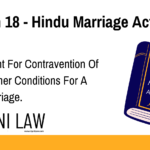Code: Section 23 – Hindu Marriage Act, 1955
- Decree in proceedings.—
(1) In any proceeding under this Act, whether defended or not, if the court is satisfied that—
(a) any of the grounds for granting relief exists and the petitioner (except in cases where the relief is sought by him on the ground specified in sub-clause (a), sub-clause (b) or sub-clause (c) of clause (ii) of section 5) is not in any way taking advantage of his or her own wrong or disability for the purpose of such relief, and
(b) where the ground of the petition is the ground specified in clause (i) of sub-section (1) of section 13, the petitioner has not in any manner been accessory to or connived at or condoned the act or acts complained of, or where the ground of the petition is cruelty, the petitioner has not in any manner condoned the cruelty, and
(c) when a divorce is sought on the ground of mutual consent, such consent has not been obtained by force, fraud or undue influence, and
(d) the petition (not being a petition presented under section 11) is not presented or prosecuted in collusion with the respondent, and
(e) there has not been any unnecessary or improper delay in instituting the proceeding, and
(f) there is no other legal ground why relief should not be granted,
then, and in such a case, but not otherwise, the court shall decree such relief accordingly.
(2) Before proceeding to grant any relief under this Act, it shall be the duty of the court in the first instance, in every case where it is possible so to do consistently with the nature and circumstances of the case, to make every endeavor to bring about a reconciliation between the parties:
Provided that nothing contained in this sub-section shall apply to any proceeding wherein relief is sought on any of the grounds specified in clause (ii), clause (iii), clause (iv), clause (v), clause (vi) or clause (vii) of sub-section (1) of section 13.
(3) For the purpose of aiding the court in bringing about such reconciliation, the court may, if the parties so desire or if the court thinks it just and proper so to do, adjourn the proceedings for a reasonable period not exceeding fifteen days and refer the matter to any person named by the parties in this behalf or to any suitable institution or person as the court may think fit.
(4) In every case where a marriage is dissolved by a decree of divorce, the court shall give a copy thereof free of cost to each of the parties.
Explanation of Section 23 – Hindu Marriage Act
Section 23 lays down the conditions under which a court may grant relief (such as divorce or annulment) in proceedings under the Hindu Marriage Act. The purpose is to ensure that relief is granted only when all procedural, ethical, and legal safeguards are met.
Key Points:
- Relief will be granted only if the petitioner is not guilty of any wrongdoing or taking advantage of their own wrong.
- Mutual consent must be genuine—free from coercion, fraud, or undue influence.
- The petition must not be based on collusion between the parties.
- The court must attempt reconciliation where possible.
- The court can refer the matter to mediation or counseling for up to 15 days.
- A free copy of the divorce decree must be provided to both parties.
Illustration
Example 1: Divorce Sought on Grounds of Cruelty
A husband files for divorce alleging cruelty under Section 13(1)(ia). The court checks whether the husband has condoned the cruelty or if he was complicit. If he has not, and the other conditions under Section 23 are met, the court may grant the divorce.
Example 2: Mutual Consent Divorce
Both spouses file for divorce by mutual consent under Section 13B. The court ensures that consent is voluntary and not obtained by fraud or pressure. If satisfied, and all other procedural requirements are met, the court grants the decree of divorce.
Common Questions and Answers on Section 23 – Hindu Marriage Act
1. Can a court deny divorce if the petitioner is guilty of misconduct?
Yes. If the petitioner is taking advantage of their own wrong, the court can deny the relief even if the other party has committed a matrimonial fault.
2. Is reconciliation mandatory before granting a divorce?
Yes. The court must try to reconcile the parties, except where serious grounds like insanity, cruelty, or abandonment apply.
3. What if both parties agree to divorce but one of them is pressured?
The court will not grant the divorce. Consent must be genuine. If obtained by force or fraud, the petition will be dismissed.
4. How long can reconciliation attempts last?
The court may adjourn the proceedings for reconciliation for up to 15 days and refer the matter to a mediator or counselor.
5. Do both parties get a free copy of the divorce decree?
Yes. As per sub-section (4), both parties must be provided a copy of the divorce decree free of cost.
Conclusion
Section 23 of the Hindu Marriage Act is a vital provision that ensures fairness, prevents misuse, and promotes reconciliation wherever possible. It empowers courts to exercise judicial discretion while balancing individual rights and societal values. Whether the case is contested or mutual, the court scrutinizes each aspect thoroughly before passing a decree.
For more clarity or legal help, visit the experts at ApniLaw.











